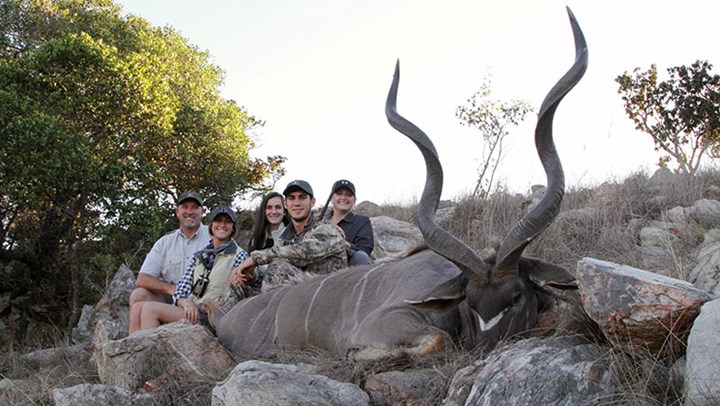
by McKenzie Fry - Saturday, April 28, 2018

*Pictured above: This kudu taken by the author's brother provided a healthy meal for the Fry family while in South Africa and for many local residents. From left: the author's father, Todd; the author; sister TaLesse; brother Jensen; and mother, Sherry.
My first trip to Africa was quite memorable and even more so informative. I’d spent nearly my entire childhood following my dad around on his exciting hunting adventures and had been around guns as long as I could remember, but I was still extremely skeptical about the idea of hunting. Why kill animals just to mount them on your wall? I wondered. I was not focusing on the fact these animals supplied food for hunters’ families. It was not until my family and I recently traveled to South Africa that I had a change of heart following some newfound information. It was there that I realized hunting is not just a game. It is about conservation—animal conservation, land conservation and economic conservation. The sad truth is that if ethical, law-abiding conservation-minded hunters are not able to do what they do, poaching will become an even bigger problem than it already is.
One of the first things I learned on this trip was that hunting allows the surrounding villages to survive. The money generated from hunting benefits the local people, providing both personal and economical gains. First and foremost, the conservation of species in the act of hunting can feed entire villages. When you see firsthand how your shot and the animal you kill feed so many people, it is hard to view hunting solely as a “game”. By contrast, in places where hunting is banned, both wildlife and the local economy suffers. Native indigenous peoples ultimately take to poaching to supply their families with food. This fact was an eye-opener as was witnessing how hunting conservation also provides for numerous jobs all over the world. Jobs funded by hunters’ dollars range from game wardens, hunting guides and anti-poaching patrols to waitresses and hotel clerks in areas where hunters travel to hunt.
"The sad truth is that if ethical, law-abiding conservation-minded hunters are not able to do what they do, poaching will become an even bigger problem than it already is."To help put things in perspective half a world away, southern Africa has experienced a three-year drought that is becoming worse by the day. While there, we were advised to check out a watering hole on a property we were hunting where game animals were known to frequent. However, the drought had already caused this hole to dry up. Our PH informed us that the funds from just one hunt could have brought back this water source in addition to several others. Ultimately, one animal’s death by a hunter would have prevented the 20 to 30 other animals we were told suffered from dehydration.
The act of hunting aside, there are other ways hunters contribute to conservation. Through donations to various groups, hunters contribute millions of dollars a year to conservation efforts. In addition, hunters even requested an excise tax on guns, ammo, bows and arrows simply to fund conservation efforts nationwide through the Pittman-Robertson Act of 1937. More than $11 billion has been raised to date. As reported by this website, more than $1.1 billion dollars were amassed for wildlife conservation in 2016 alone. The conservation funding helps with everything from balancing wildlife populations to maintaining the land by limiting crop damage and managing wildlife disease outbreaks. Without hunters’ dollars, the government would have to intervene and find a way to pay to control these factors.
Compiling the general public’s lack of understanding when it comes to hunting’s benefits, the media regularly negatively portrays the issues surrounding hunters and hunting. However, much of what is reported is based on a lack of knowledge and misinformation that pertains to poaching—not hunting. In truth, the professional hunting outfitters and guides who lead hunters on their hunting adventures know what they are doing. They know which animals to target for specific reasons, whether due to the animal’s age or maturity or other criteria. Since the topic of elephant hunting is a major discussion these days, I found it interesting how little knowledge we, the general public, actually has on this issues. Unlike humans, elephants have several sets of teeth they go through throughout their lifespan, each set pushing the previous set out of their mouth. After the last set falls out and there are no new teeth to replace them these elephants end up starving to death. Trained professionals know these details about this species and many others. It is from this information, and so much more, that I am finally able see the justification in hunting conservation.
■ ■ ■
Editor’s Note: To the author’s point, many people confuse poaching with hunting. To read the NRAHLF.org fact sheet “Poaching Is Not Hunting,” click here.
E-mail your comments/questions about this site to:
[email protected]
Proudly supported by The NRA Foundation and Friends of NRA fundraising.
